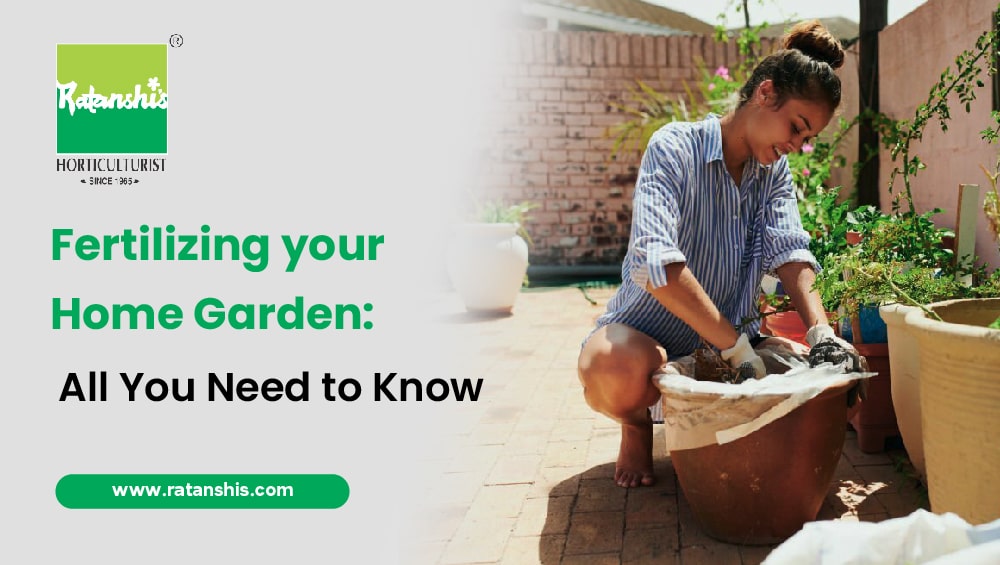
Houseplants need water and sunlight, but do they also need fertilizer? Nitrogen (N), phosphorus (P), and potassium (K) are all critical elements that houseplants require to survive during their growing time.
Fertilizers might be scary for those unfamiliar with the terminology or content. Experts categorize fertilizers into different ones to make them easier to comprehend. However, if you are still unsure, gardening experts at Ratanshi Agro-Hortitech are here for your help.
Fertilizer- what is it?
It is essential to know the basics! Fertilizer is not a plant's primary source of nutrition i.e. food. Plants get food through photosynthesis, a process through which plants convert sunlight into food. Fertilizers are elements that support the natural growth of plants.
It is essential to replenish the nutrients plants lose from the soil as they grow. Many nutrients are available through fertilizers, but nitrogen, phosphorus, and potassium (N-P-K) are the three most important macronutrients.
Fertilizers and Their Types
Organic and inorganic fertilizers both exist.
- Organic fertilizers are better for the environment but often contain unpleasant constituents like worms, slurry, and manure. It is essential to avoid organic fertilizers that don't disclose their ingredients. In addition to feeding the soil, organic fertilizers also nourish the soil. However, the results are slower to appear.
- Inorganic fertilizers are easily available in supermarkets. Because of their quick and easily breakable constituents, one may witness fast plant growth. High nitrogen, phosphorous, and potassium content make these fertilizers more effective. For the most part, inorganic fertilizers are non-toxic and non-toxic to animals.
Fertilizing houseplants: Essential tips
- The optimal time to begin feeding your plants is in the spring when plants grow the most. Fertilize fast-growing plants more often than slow-growing plants like cacti
- Secondly, dilute the fertilizer. Underfertilization is preferable to overfertilization. Adding less water while diluting fertilizer might boost its efficacy if the potting mix is deficient in nutrients and the plants have not undergone fertilization throughout the year.
- Fruit and flower-bearing plants demand more fertilizer throughout their lives. We remove nutrients from the plant when we pluck flowers and fruits. Hence, it is essential to replace those nutrients as soon as possible.
- Be familiar with the N, P, and K quantities. Those macronutrients are what your plant requires. Seek balance ratios. If you are still unsure, consult experts at the online plant nursery in Mumbai or a plant nursery near you.
- Plants require fewer micronutrients, yet they are equally as necessary as macronutrients. Micronutrients are often included in fertilizers, although their presence isn't always clear on the fertilizer label.
What kind of fertilizer to use totally depends on you!
Top fertilizers FAQs
If you are still searching for terms like seeds and fertilizer shop near me, look no further. Ratanshi Agro-Hortitech is a leading online plant nursery in Mumbai that offers extensive support to its customers, from plant to fertilizer selection. Experts at the plant nursery in Byculla often come across these common questions.
- My fertilizer pack has some numbers, what does it convey?
Generally, only three of the 17 necessary plant nutrients are available on the fertilizer label.
The N-P-K ratio is as follows:
- N stands for nitrogen
- P stands for phosphorus
- K stands for potassium
These are macronutrients that a plant requires.
A fertilizer label in a plant nursery in Mumbai can have an N-P-K ratio of 10-5-8. A high ratio indicates more concentration. The higher the number, the more concentrated it is and will require more water for dilution. It is not always a bad thing and requires careful consideration.
- How many times can one fertilize indoor plants?
The sort of plant you have and the soil type will impact the fertilization duration. Few houseplants need a lot more food to keep them growing and healthy.
One can feed houseplants every 2 weeks to once monthly, depending on their needs, type, and fertilizer.
Final thoughts
Elements like nitrogen, phosphorous, and potassium are included in most fertilizers for houseplants plants since these nutrients are essential to the health and well-being of the plants. Ratanshi Agro-Hortitech recommends checking the fertilizer label to see what nutrients it contains and whether it is appropriate. For more information on fertilizers, gardening tools, planters, and the best organic seeds online in India visit their website or plant nursery in Byculla today. You can also place a call to learn more about their products.
